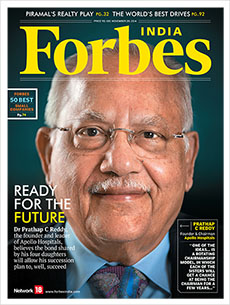
The Apollo Hospitals Prescription for Tomorrow
Two-thirds of the Indian family-owned businesses have a succession plan in place, just 15 percent have one that is "robust and documented"
As family-controlled companies get hungrier for growth in a competitive business environment, one of the key areas on which most family-owned organisations are beginning to focus is the issue of succession. This typically has two aspects to it. One, any succession plan will need to ensure that the new structure being put in place does not impinge on the growth momentum of the business. Second, in cases where there are multiple family members involved in the business, the plan will also need to be fair to the aspirations of all. Family business experts say, in some cases, patriarchs also think of diversifying into new areas to satisfy entrepreneurial ambitions of individuals.

In this context, our cover story this time on one of the best-known Indian health care companies, Apollo Hospitals, assumes particular significance. The group, now well into a high-growth phase, is in the midst of chalking out a detailed succession plan, with the active involvement of founder-chairman Dr Prathap C Reddy and the family council. One of the proposals, a most interesting one, is that of a rotating chairman, in which Dr Reddy’s four daughters, each of whom has been actively involved in the company, will take turns at the top job. If the proposal finally gets green-lighted by the company, it would be a test case for business families in India and one which undoubtedly would be keenly watched by shareholders. What seems to be working for Apollo, as Assistant Editor Shabana Hussain finds out in the story, is the deep bond between the four sisters and their shared goal for Apollo. Whether this translates into a smooth succession once Dr Reddy hangs up his boots will be worth keeping track of.
Best,
Sourav Majumdar
Editor, Forbes India
Email:sourav.majumdar@network18publishing.com
Twitter id:@TheSouravM
(This story appears in the 28 November, 2014 issue of Forbes India. To visit our Archives, click here.)















